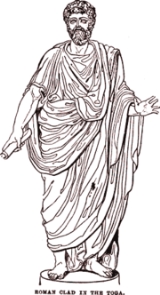
Social class in ancient Rome
Overview
Social class
in ancient Rome
was hierarchical, but there were multiple and overlapping social hierarchies. The status of free-born Romans was established by:
Social class
Social classes are economic or cultural arrangements of groups in society. Class is an essential object of analysis for sociologists, political scientists, economists, anthropologists and social historians. In the social sciences, social class is often discussed in terms of 'social stratification'...
in ancient Rome
Ancient Rome
Ancient Rome was a thriving civilization that grew on the Italian Peninsula as early as the 8th century BC. Located along the Mediterranean Sea and centered on the city of Rome, it expanded to one of the largest empires in the ancient world....
was hierarchical, but there were multiple and overlapping social hierarchies. The status of free-born Romans was established by:
- ancestry (patrician or plebeianPlebsThe plebs was the general body of free land-owning Roman citizens in Ancient Rome. They were distinct from the higher order of the patricians. A member of the plebs was known as a plebeian...
); - census rank (ordo) based on wealth and political privilege, with the senatorialRoman SenateThe Senate of the Roman Republic was a political institution in the ancient Roman Republic, however, it was not an elected body, but one whose members were appointed by the consuls, and later by the censors. After a magistrate served his term in office, it usually was followed with automatic...
and equestrian ranks elevated above the ordinary citizen; - attainment of honorsCursus honorumThe cursus honorum was the sequential order of public offices held by aspiring politicians in both the Roman Republic and the early Empire. It was designed for men of senatorial rank. The cursus honorum comprised a mixture of military and political administration posts. Each office had a minimum...
(the novus homoNovus homoHomo novus was the term in ancient Rome for a man who was the first in his family to serve in the Roman Senate or, more specifically, to be elected as consul...
or self-made man established his family as nobilisNobilesDuring the Roman Republic, nobilis was a descriptive term of social rank, usually indicating that a member of the family had achieved the consulship. Those who belonged to the hereditary patrician families were noble, but plebeians whose ancestors were consuls were also considered nobiles...
, "noble", and thus there were noble plebeiansNobilesDuring the Roman Republic, nobilis was a descriptive term of social rank, usually indicating that a member of the family had achieved the consulship. Those who belonged to the hereditary patrician families were noble, but plebeians whose ancestors were consuls were also considered nobiles...
); and - citizenshipRoman citizenshipCitizenship in ancient Rome was a privileged political and legal status afforded to certain free-born individuals with respect to laws, property, and governance....
, of which there were grades with varying rights and privileges.

